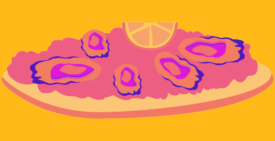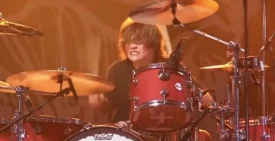
If your grief were an object, where would you put it?
I’m 20 years old, I’ve just lost my mom, and some therapist in a flowery blouse wants to know. I raise my eyebrows to assess if she’s serious. She is. I close my eyes and envision my grief taking on an amorphous shape: a slippery blob of slime I struggle to contain, let alone put away.
Tupperware?
It’s the first thing that comes to mind. Luckily, she goes with it.
OK, and where can you put the Tupperware?
I’m a junior at Syracuse University. I picture the run-down, off-campus house I share with my college roommates and search my bedroom for the perfect hiding spot.
Under my bed?
She nods, as if this is a completely sane idea.
For a while it works, this image of Tupperware. And when grief comes to haunt me–when I first wake up and remember my mom is dead, or when my friends laugh at a frat party while I feel heavy enough to sink into the beer-stained floor–I try to stuff the blob into the plastic container, snap it shut and shove it under the bed.
But soon there’s too much for the Tupperware to hold, and so I put the grief into something new: a book my mom and I began writing together when she was first diagnosed with pancreatic cancer. A book we continued to write during the two-and-a-half years she was sick, alternating chapters to document what we were each going through. A book she left behind for me to finish after she died.
Within the book project, my grief takes on a more solid shape. It can’t haunt me at any moment, because I allot for a certain time and place for it to consume me. The book and the grief and my mother morph into one object and keeps me company as I graduate from college, wander through my twenties, and get married and have kids in my thirties. As I move through adulthood without her, the book becomes a way for me to hang out with my mother. Every Sunday, that’s where you find me, sitting in our sunny Brooklyn apartment or a quiet coffee shop, ears filled with late ‘90s songs, eyes rereading our journals, hands typing both her words and mine, heart filled with my beautiful mother who left too soon.
While writing the book, I never had to truly say goodbye to my mother. But then, after eighteen years, I finished it. I feel both the relief of letting it go, and the loss of those peaceful Sundays spent with her.
And, of course, I find myself back at the same question: Where do I put my grief?
The obvious answer is in the tiny faces that interrupt my every thought. The ones belonging to my toddler son and baby daughter. From the time they were born, they are where my mother seems to reside. Her lullabies echo in my songs, her affection courses through my veins, her loud laugh escapes from my mouth. She is so vividly here, in a way I never expected, and in a way that I was resistant to for a long time.
And yet, she’s not–not in the way I long for. You’d think that after 17 years I’d have accepted this. And yet now, anticipating our book launch without her, each day provides nail-biting, chest-pained, mind-racing anxiety. The same I felt before getting married. The big life celebrations only underscore her absence. I torture myself imagining her beside me at the launch party, making inappropriate jokes and being that pushy Jewish woman who shoves books into people’s hands and sneakily leads them to the register.
With both my wedding and the book release, the question is the same: How do I do this without her?
Maybe I do it the way in which we all do it. None of us want to go on without our mothers, and yet we do. One day at a time, one step down the aisle at a time, one book event at a time. We move forward because it’s the only thing we can do. We do all the things without our mothers, and yet we also do them with our mothers–at least, on the days we’re able to feel them close by. And, inevitably, we do it for a hidden reason, one that’s ingrained in us as children and continues even now: to make our mothers proud.
Marisa Bardach Ramel is co-author of The Goodbye Diaries: A Mother-Daughter Memoir (Wyatt-MacKenzie, 2019), which alternates chapters with her mother Sally Bardach. Follow her posts about loss and healing on Instagram (@marisa.bardach.ramel), Facebook (@mbardach), and Twitter (@mbardach).









